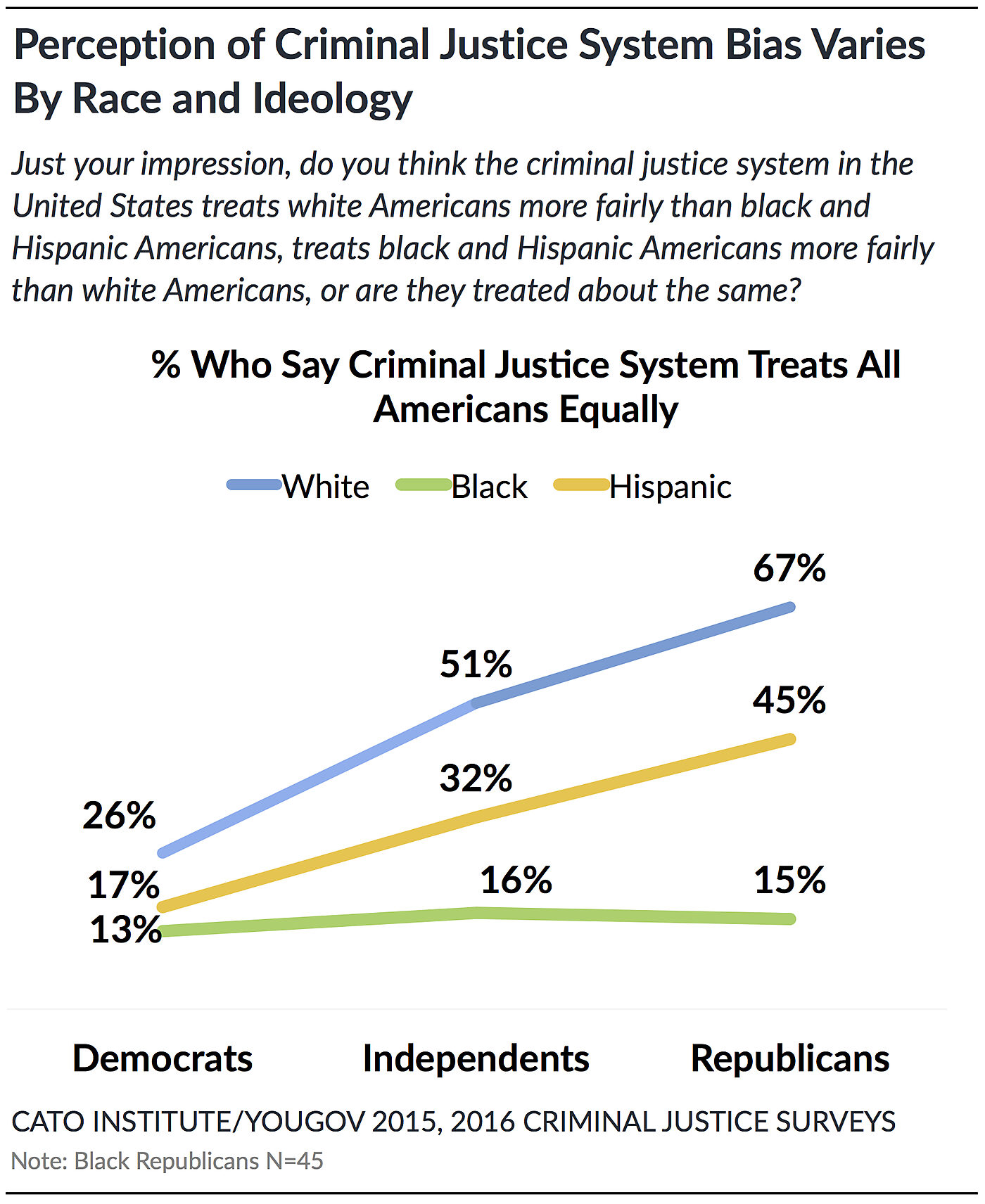Survey data shows that black Republicans and Hispanic Republicans are far less likely than white Republicans to believe the nation’s criminal justice system is impartial.
I was able to combine two surveys conducted by the Cato Institute that included the same question on impartiality in the justice system to obtain a much larger sample size.[1] This offers an opportunity to take a look at how Republicans who are black, white, and Hispanic think about the justice system. Why do this? Essentially this “controls for” or accounts for the effect of political values when looking at how different racial/ethnic groups evaluate bias in the justice system.
When combining the surveys we find that 42% of Americans think the system in the U.S. treats white, black, and Hispanic Americans equally. A plurality (46%) think the system gives preference to white Americans and 12% think the system treats minorities better.
Republicans (64%) are far more likely to think the system treats everyone fairly than Democrats (21%) and independents (43%). However, black and Hispanic Republicans are far less confident than white Republicans. Only 15% of black Republicans think the justice system treats everyone equally, compared to 67% of white Republicans. Hispanic Republicans fall in between with slightly less than half (45%) who think the system is fair. Consequently, Republicans who are white, Hispanic, or black, have dramatically different views of racial bias in the justice system.
In contrast, Democrats are far more similar: 26% of white Democrats, 17% of Hispanic Democrats, and 13% of black Democrats believe the justice system treats all people equally.
Looking at this data altogether, we notice a pattern: white Republicans (67%) are 16 points more likely than white independents (51%) and 41 points more likely than white Democrats (26%) to believe the system is fair. We observe a similar but attenuated pattern among Hispanics: Hispanic Republicans (45%) are 13 points more likely than Hispanic independents (32%) and 28 points more likely than Hispanic Democrats (17%) to believe the system is fair. However, black Republicans (15%) are about as likely as black Democrats (13%) and black independents (16%) to think the justice system is impartial. Ultimately, white Republicans are the only group that solidly believes the justice system treats all citizens equally before the law.
Why do Republicans who are black, white, and Hispanic have such different views of racial bias in the justice system? There could be several reasons, but the most obvious one to consider is that African Americans may be having different personal or vicarious experiences with the system.
Critics who argue perceptions of racial bias in the justice system are false contend that such perceptions are merely the result of “radical” “anti-cop ideology” or “elites’ investment in black victimology.” But these reasons tend to be associated with the political Left, not the political Right. How many Republicans (black, white or Hispanic) could be identified as “radical” who embrace “victimology”? A better explanation might be that people feel the system is biased based on their experiences rather than simply because they are inclined to rebel against authority figures.
For public opinion analysis sign up here to receive Cato’s upcoming digest of Public Opinion Insights and public opinion studies.
div[1] Question wording: “Just your impression, do you think the criminal justice system in the United States treats white Americans more fairly than black and Hispanic Americans, treats black and Hispanic Americans more fairly than white Americans, or are they treated about the same?” Data about perceptions of systemic bias by race/ethnicity and partisanship come from the combined June 2016 and November 2015 national surveys (N=4000), which offer greater precision and smaller margins of error for subgroups. (Unweighted: Black Republicans=45, Hispanic Republicans=165, White Republicans=1193, Black Democrats=630, Hispanic Democrats=409, White Democrats=634.) Results have been weighted to be representative of the national population.

